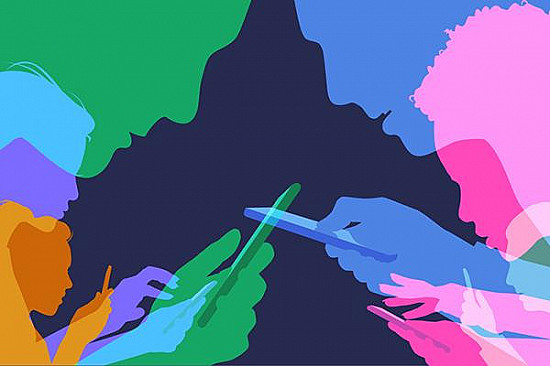
Do you follow certain social media creators, music artists, actors, athletes, or other famous people? Are you a huge fan of particular fictional characters from a book, TV show, or movie? Perhaps you check in with them daily because you feel a connection, care about them, or just love keeping up with the minutiae of their lives.
These one-sided emotional ties to people you don’t actually know (or those who don’t actually exist) are called parasocial relationships. Like all relationships, they come with risks and benefits, says Arthur C. Brooks, a social scientist, best-selling author, and professor at both the Harvard Kennedy School and the Harvard Business School.
Why do we develop parasocial relationships?
Parasocial relationships tend to occur because of our natural tendency to link to others.
“Humans have evolved to thrive in groups, probably because 250,000 years ago you needed to rely on other people to survive by building social relationships. And so we become attracted to and care about people if we have a regular enough exposure to them,” says Brooks.
We are all exposed regularly to tiny details about celebrities and fictional characters, watching their days unfold on social media or learning about them from a TV show or book. What hooks us is the emotional connection, especially if the person is exciting or compelling.
“That’s the secret to the success of the Harry Potter book series and the TV show Breaking Bad. The writing is supposed to engage you emotionally,” Brooks says. “People can form a bond even if the characters are psychopaths.”
The upsides of parasocial relationships
Parasocial relationships can be a nice complement to your life. They might entertain you, inspire you, educate you, or bring you comfort. You might feel less lonely or like you’re part of a tight group or a cultural moment, a feeling the shows Friends and Game of Thrones fostered for many people.
Bonding emotionally with famous or fictional people might also shape people’s values. For example, children might learn lessons about right and wrong from characters they connect with on shows such as Sesame Street or Bluey. Teens or adults might feel moved to work harder if they’re attached to champion athletes, or do good deeds if they admire selfless leaders.
One study of more than 300 people ages 18 to 35 even found that parasocial relationships might help reduce the stigma of mental health conditions. All participants watched one video of someone who shared personal information aimed at creating a social bond. Then, some participants also watched a video of the content creator sharing his challenges with bipolar disorder. Those who saw both videos scored lower on measures of prejudice about mental health conditions than those who only saw the first video.
The downsides of parasocial relationships
While parasocial relationships can enrich your life, these one-sided affairs can also hurt you.
- They won’t love you back. “They’re like fake food. They taste good, but they have no nutritional content and won’t meet your needs. You need to love and be loved in return to thrive,” Brooks says.
- They might contribute to loneliness and isolation if you rely on them too much. Loneliness and isolation are linked to increased risks of many chronic health problems such as depression, anxiety, dementia, and heart disease, and even premature death.
- They might have a negative influence on you. Are you picking up unhealthy ideas from the people you follow? Brooks says this should be a special concern for parents whose kids have parasocial relationships: The messages kids glean might be at odds with your values — perhaps because they are controversial political or adult themes.
Navigating parasocial relationships
A dollop of parasocial relationships in your life is fine as long as they don’t crowd out real-life bonds or warp your thinking and values. But how would you know if this was becoming an issue?
Two red alerts:
- Ask yourself if you’re too attached. For example, are you skipping dinner with friends because you prefer watching a TV show with a character you care about and want to connect with?
- Be wary. “If someone is trying to brainwash you, saying, ‘I’m your friend, you can trust me,’ that person is using a personal social bond to get you to do something — like vote a certain way,” Brooks says. He points out that social media stars try to establish parasocial relationships with followers to get more clicks and make money. “That’s what the new economy is all about — monetizing parasocial relationships on a mass scale,” Brooks says.
Shifting from parasocial relationship to deeper connections
Parasocial relationships fill a need. Social scrolling, streaming shows, or following celebs may tamp down loneliness or offer curated moments of joy and connection. But if you’re leaning too hard on these one-sided relationships, Brooks advises taking a hard look at what’s missing from your life.
Forging warm connections in real life is worthwhile, though it isn’t always easy. “It’s a tall order for people who are shut-ins or introverted or don’t have social skills, but you can start small. Have dinner with a friend. Spend more time with your family. Get more human eye contact. Touch, such as a hug, releases the bonding hormone oxytocin in the brain,” Brooks suggests. “You’ll care less about the characters and get what you really need.”
